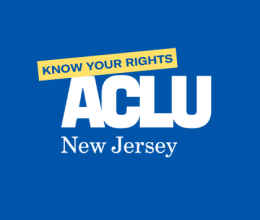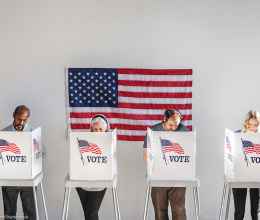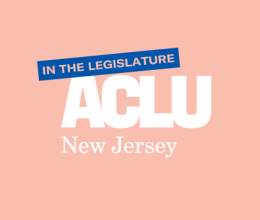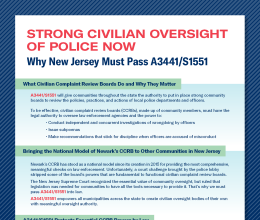
In the last year, ACLU-NJ Senior Staff Attorney Karen Thompson has worked on cases that speak to the national moment in civil rights. She shares her perspective on working toward racial justice and police accountability in New Jersey through the legal system and changes in the law.
Are there themes that you see throughout your work?
We see a common thread of inequality that weaves through every case at the ACLU, and we see systems in place that create and sustain disparities. Our work is to work toward parity.
How do your cases relate to the national landscape of racial justice, past and present?
My cases are microcosms of macro issues. Although our cases are uniquely New Jerseyan, all of the issues we face as an ACLU affiliate are nationwide, 50-state issues. For example, the anger that welled up in Newark after yet another act of police-inflicted violence created the first request for civilian oversight of police in New Jersey in 1968. Yet today, more than 50 years later, we’re fighting the same fight: for a CCRB with real subpoena powers, and for accountability and transparency in policing in the Legislature.
How is racism upheld in the law in ways that we don’t see?
In our work, we see that racist practices are buttressed by a scaffolding of racist law. Doing research for an argument, I came across laws segregating cemeteries in the U.S. — if a dog’s human was Black, it was illegal for that dead dog to be buried next to a dog whose human was white.
This ridiculousness is the structural part of racism, where culture, expectations, and moral codes are created and deeply impact the psyches of Americans. This carefully crafted diminishment of Black folks’ worth is equally and oppositely met by a carefully crafted false inflation of white Americans’ worth. In experiencing these ridiculous exclusions, you either pretend it isn’t happening at all, or convince yourself it is happening because “they” deserve it. As ACLU lawyers, we have to recognize these racist threads and how deeply interwoven they are in the legal system. We have to tweeze out the subtleties of how those racist bones still hold up the muscles of the system. It’s important that people understand white supremacy doesn’t exist as some sort of free-floating, random thing. It is deliberate, it is thought out, it is carefully manicured and maintained.
When you think of the audacity of the arguments made in the past (segregated pet cemeteries!), it makes me think that everything must be as audacious in the other direction towards the cause of equality and parity.
Are there any particular cases that have affected you?
A case I worked on, State v. Garcia, involved a man who was arrested allegedly for assault, but there was strong evidence that it was self-defense. At the scene, his family assiduously tried to tell police Mr. Garcia was defending himself, although English was not their first language. The police basically ignored them, but the family recorded the interaction on their phone. At trial, the prosecutor successfully fought to keep the video hidden from the jury. Then, knowing full well what was on the recording, he told the jury that Mr. Garcia could not have acted in self-defense, because if so, someone would have said something and no one did.
Thankfully, the Supreme Court found the prosecutor’s conduct was so prejudicial, they overturned the sentence, and Mr. Garcia was released from prison where he’d been held for over a year. Seeing that sort of deception — and knowing this is one of the rare instances in which it’s successfully revealed — it’s chilling. The prosecutor blithely goes about trying to get a conviction using a false narrative, and then all of the prosecutorial resources of the state are deployed to protect that conviction on two appeals, and to protect these sorts of wrongs that go beyond Mr. Garcia’s experience. All the while, Mr. Garcia’s life, his family’s peace of mind, his child’s access to his father — they are all disrupted. It’s the ease with which this sort of pain is inflicted on people that never ceases to shake me to my core. It’s also what gets me going every morning.
You’re working on challenges to qualified immunity — can you talk about why that’s so important, and how you think we can achieve change?
Qualified immunity (QI) is a doctrine created in the courts that protect state and local officials, including law enforcement officers, from civil liability unless the official has violated a clearly established constitutional right, which has been interpreted in such a way as to make that “established right” hard to prove. This doctrine has become the cornerstone of a near‐zero accountability policy for law enforcement.
This is particularly dangerous because it means there are few incentives to behave differently; it means that brutality can go without consequence.
Ending QI begins to create the racial repair that we need after centuries of brutal and violent policing. With real legal accountability for police misconduct, communities have more reasons to believe that individual officers are invested in respecting people’s constitutional rights because it could impact them personally.
We have drafted language for a bill repealing QI that would serve to strengthen those protections while also creating much-needed accountability between police officers and communities.




